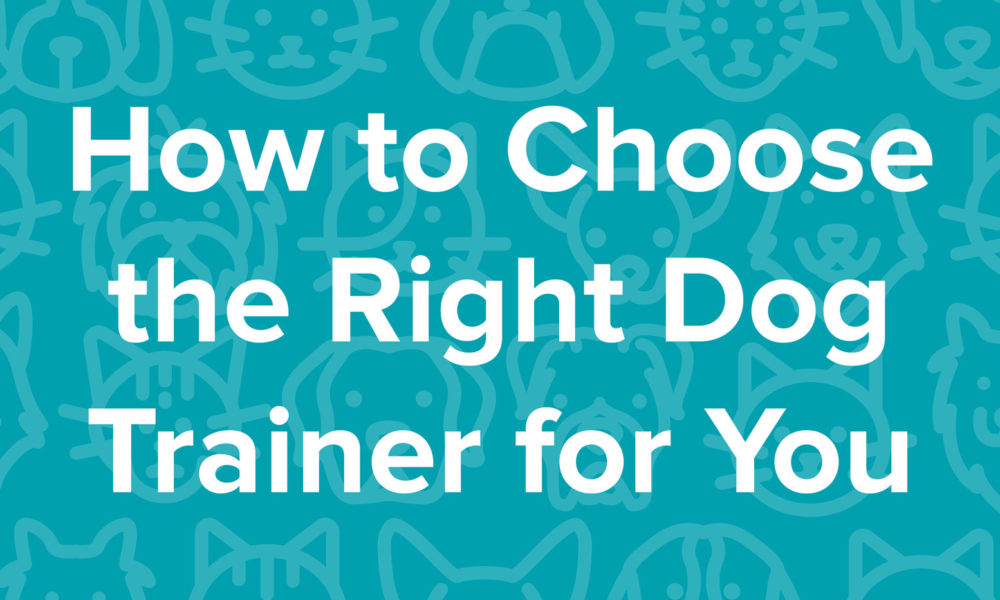How to Choose the Right Dog Trainer for You

When someone is interested in adopting a dog, one of the things our staff tells them is how important training is for a dog. We know that most dogs are pretty smart – but all dogs need some kind of training. Some dogs need basic obedience, and others have specific issues that a trainer can help with like jumping, and pulling on the leash, or more serious issues like separation anxiety or aggression.
One question new dog parents ask is, ‘There are so many dog trainers out there. How do I choose the right one?’ Well, here are some tips when choosing a trainer.
First, you need to figure out what you and your dog need. If you need basic obedience, most certified trainers can handle that but, if there are more serious issues like fears or aggression, you should find someone who has experience with behavior modification. Once you decide what type of training you need, there are some other things to consider:
Private Training or Group Classes: Group classes are often best for basic obedience, teaching manners and general skills such as responding to commands. Private training may be better if you are dealing with a specific problem or more serious issue such as aggression or anxiety.
Location of the Training: Most group classes are held in a community location such as a shelter or a training facility (like here at the Potter League!). You can also have training classes done at your home.
Cost: As you would expect, private training is typically more expensive, so you will need to think about your budget when deciding on a training option.
Time: How much time do you want to spend in training and how much time will you need to spend to reinforce the training? No training is going to stick without some reinforcement when the trainer is not there!
Once you have answered these questions, you can start looking for the trainer. You can find trainers in all sorts of ways – recommendations from a friend, searching on the Internet, or your local shelter (hint, hint – the Potter League!). When you find a trainer that interests you, interview them to be sure that you are comfortable with their training methods. Some important questions to ask are:
Do you use primarily reward-based training? There are many good ways to conduct training but, the use of forceful, painful or punishment-based methods is never acceptable.
What certifications do you have, and do you participate in regular continuing education? There are many different types of education and certification available for dog trainers and good trainers have completed their own training and education and stay up to date with their knowledge and skills on a regular basis. We recommend that trainers have credentials that include a certificate through professional dog trainers such as CPDT-KA, CCPDT, KPA, or IAABC-ADT, which ensures they have gone through rigorous exams to demonstrate mastery of humane, science-based dog training practices.
May I watch you train? A competent trainer should always allow you to watch any training done with your dog. Most trainers, especially those conducting a group class, will have you participate in the training. After all, you’re the one who is going to have to reinforce this training at home.
Do you guarantee results? Although we all wish that the answer to this question was ‘yes,’ just like with many things in life, there is no guarantee in dog training. Animal behavior is never fixed or static. It changes depending on the environment or circumstances. That would be an improbable promise, because even if a behavior is changed, there is no guarantee that it will not come back.
What information do you need about my dog from my veterinarian before we start training? Trainers should ask for information about your dog’s current vaccinations and any health issues that may influence training. This is especially important if you are participating in a group training class where your dog will have contact with other dogs.
Once you have chosen your dog trainer, you should trust them and feel comfortable working together’ you should have regular communication about your dog’s progress (after all, your kids get report cards, don’t they?!), and most importantly remember, you are being trained too! You and your dog are learning skills that will make your life together even better.
Still not sure where to start? Right here at the Potter League, of course (or on our website, if you prefer). Our resources include all types of training classes including basic obedience, behavior issues such as leash reactivity, and agility, and we offer private behavior consultations. We even have puppy play groups to help your dog learn to socialize with other dogs!
The Potter League also offers Behavior Resources that can be downloaded from our website and a Behavior Helpline where you can get advice by phone or email, because as we say, ‘Sometimes a little advice can make all the difference.’
